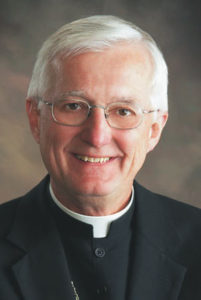Dear Sisters and Brothers in Christ,

Pope Benedict XVI has called us to observe this Year of Faith and to engage in the New Evangelization, a purposeful sharing of the Good News of Jesus Christ within the Church and outside into the world, a proclamation in word and deed that flows from a renewed relationship with Jesus Christ.
As “new evangelists” we are challenged to take seriously our call to deepen our relationship with Christ. For that reason, the Holy Father reminds us that “The New Evangelization… begins in the confessional!” Therefore, along with my brother bishops around the country, I take this opportunity to invite and encourage all of us to avail ourselves of the “extraordinary gift” that Christ has given us in the sacrament of reconciliation.
It is true that while the sacrament of reconciliation is, strictly speaking, necessary only for the healing of serious sin, there is much more to the sacrament than this minimum. I would encourage all of us to celebrate the sacrament frequently — as we bishops stated in our letter — “in order to grow closer to Christ Jesus and his Body, the Church.”
As St. Paul wrote, “We all sin and fall short of the glory of God” (Rom 3:23). As we bishops wrote, “In order to be whole, we need to “seek forgiveness and repentance… let go of patterns of sin [and] grow in the life of virtue.”
Such an opportunity is ours by the grace of this sacrament! What more could we ask for this Lent?
Yours in Christ,
Most Rev. Martin Amos
Bishop of Davenport
Lenten regulations
In regards to fasting and abstinence, the following applies as we observe our Lenten discipline:
• Everyone 14 years of age or older is bound to abstain from meat on Ash Wednesday (Feb. 13, 2013) and all the Fridays of Lent.
• Everyone 18 years of age and under 59 years of age is bound to fast on Ash Wednesday (Feb. 13, 2013) and Good Friday (March 29, 2013).
On these two days of fast and abstinence, only one full meal is allowed. Two other meatless meals, sufficient to maintain strength, may be taken according to each one’s needs, but together they should not equal one full meal. Eating between meals is not permitted, but liquids (including milk and fruit juices) are allowed. When health or ability to work would be seriously affected, the law does not oblige.
To disregard completely the law of fast and abstinence is a serious matter.









Great article Bishop!
The Catechism of the Catholic Church says in paragraph 1446 that, “Christ instituted the sacrament of Penance for all sinful members of his Church: above all for those who, since Baptism, have fallen into grave sin, and have thus lost their baptismal grace and wounded ecclesial communion. It is to them that the sacrament of Penance offers a new possibility to convert and to recover the grace of justification. The Fathers of the Church present this sacrament as “the second plank [of salvation] after the shipwreck which is the loss of grace.””
According to Pope John Paul II the Catechism of the Catholic Church “is given as a sure and authentic reference text for teaching Catholic doctrine.”